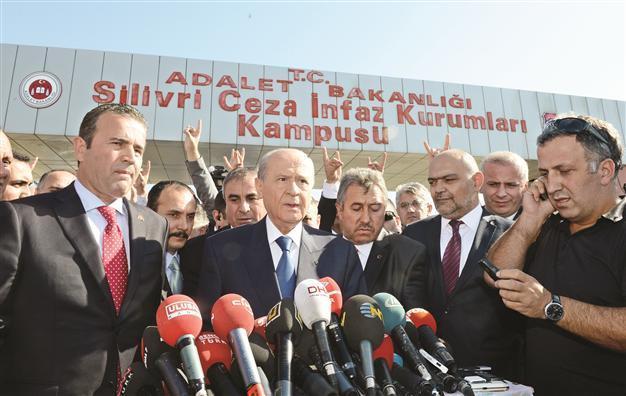Commission finds 2 problems in Silivri
ANKARA - Hürriyet

Bahçeli is seen after he visited arrested MHP MP Engin Alan at Silivri prison. AA photo
The Parliamentary Human Rights Examination Commission’s Prison Subcommission detected only two problems at Silivri Prison during their visit in June: a water problem and an acoustic problem.In the draft report issued by the subcommission, the names of former Chief of General Staff retired Gen. İlker Başbuğ, the Nationalist Movement Party’s (MHP) deputy retired Lt. Gen. Engin Alan and arrested soldiers or journalists held at Silivri Prison were not mentioned. The draft report will be discussed by the commission next week. Parliament examined the prison upon 79 appeals filed about its conditions. On the date of examination, there were 8,586 people in the prison, which has a capacity of 11,270. In the final section of the report, five of the seven issues were found to be in compliance, while the other two were found problematic.
The report first suggested that some measures should be urgently taken to resolve the water problem. Since the acoustic features of the wards would have some negative impacts on prisoners’ health, work should be started to fix that issue as well, the report said.
The report also appreciated that there is a modern hospital and a specialist doctor on call. It said cameras in common rooms did not constitute a problem and the limitations put on the right to conversation were in accordance with legislation. Improvements have been made regarding opportunities to participate in courses and for free visitation, the report said. “There are two football fields and one multipurpose sports hall in each institution. Along with sports activities, social and cultural activities such as concerts and plays are being conducted,” the report read.
The report also indicated that the common rooms of the wards are watched 24 hours a day with 324 cameras, and the camera records are retained for six months.
The report touches on the convicts’ claims. “The convicts alleged that they were exposed to an alienation policy since they could not exercise their right to conversation and their demands to benefit from social activities and courses were rejected. It was also said that cold water was given 9 hours a day, while hot water ran for 2.5 hours three days a week, and it was not sufficient time.”
“It was also claimed that the running water became muddy when hot water was given. The institution administrators indicated that the total amount of water given to every ward [400 liters] is above international standards and the amount suggested in legislation, and the problems stemmed partially from the negligent and malicious use of water,” the report said.
















